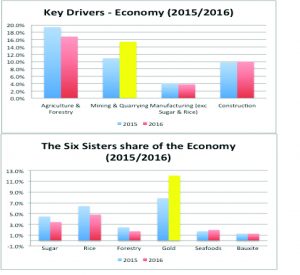– Govt wants to “drink mauby and belch beer”
When the G7 ministers from the most powerful countries of the world met to discuss the state of the global economy, they celebrated the first quarter 2017 performance. After years of underperformance, the global economy in 2017 has so far registered more impressive growth performance than what many had expected.
In Guyana, one of the few official indicators of economic growth is the “Real GDP”, which can be found in Table 10.2 of the Bank of Guyana 2016 Annual Report. This table considers the quantities of goods and services produced (at 2016) and adjust for inflation to a base year (in the case of Guyana, 2006). So it is like comparing apples to apples, and thus provides a fair indication of the state of things.
The gross domestic product (GDP) is one of the primary indicators used to gauge the health of a country’s economy. It represents the total dollar value of all goods and services produced over a specific time period. The graphs below illustrate how drastically the composition of the GDP in 2016 has changed.
If one observes the sectorial graph (labelled “Key Drivers”), both manufacturing and construction remained flat in regard to their composition of the real GDP in 2016, while agriculture drastically reduced its share. This fact can be corroborated by the adverse performance in the rice, sugar and forestry sectors, all of which contributed to a 12.1% decline in the sector over 2016. At the end of 2016, the agriculture and forestry sectors were just 16.8% of the real GDP.
If it were not for the performance in the gold industry, the Guyanese economy would have “gone for channa” by now. But a heavy long-term cost had to be paid for this expansion in the gold industry — long-term environmental degradation and destruction. Yet, President Granger told the Londoner: “We are passionate about the environment”. Clearly, his words do not match his government’s actions.
This, then, can lead to the obvious questions: Who is calling the shots in the Granger Administration? Thanks to a 58% expansion in the gold declaration in 2016, the mining sector is now 15.4% of the real GDP, compared to 10.9% a year ago. But at what cost?
The performance in the other half of the economy (the services sector), dropped in its composition of the GDP by 2% to 53%. So the year 2016 was all about gold, and nothing else. A very influential Regent Street businessman told me that Christmas 2016 was his worst trading season experienced in the last decade. But Jordan continues to attack the private sector. Carry on, comrade!
The second graph illustrates the GDP composition of the six sisters (sugar, rice, forestry, gold, seafoods, and bauxite). The bauxite and seafoods sector reflected relatively flat performances over 2016. As confirmed by the sectoral statistics, sugar, rice, and forestry have imploded over 2016. Compared to a year ago, sugar is now 3.4% of the real GDP vs. 4.5% from a year ago; rice is now 4.8% vs. 6.4% a year ago; forestry is now 1.7% vs. 2.5% a year ago. This is a dismal picture indeed!
While the gold sector continues to constitute a greater share of the real economy — climbing from 7.9% a year ago to 12.1% at the end of 2016 — no capable policy maker would ever structure an economy around one industry. What would happen if we have an environmental spill or a major outbreak of some disease in the hinterland? Do we really think it smart to put all our eggs in one basket?
This PNC-led Granger Administration wants to “drink mauby and belch beer”. Growing an economy is about hard work, not making empty speeches. To hide their gross incompetence on the big issues, paid surrogates like Clive Thomas are put out to peddle utter rubbish in an effort to play to the gallery. Only an idiot in Government would make a statement like “G$300 billion (were) lost from the economy” because of the illegal underground economy, and not one person was arrested and charged to prove those words have substance. What Clive Thomas has achieved is to help Jordan drive a huge wedge between the private sector and the Government. Carry on, Jordan!
Who cares about 2011 and 2012 when they cannot even get aspirins at the public hospitals in Guyana today? Jordanomics has failed condignly.
